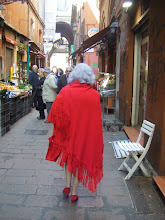
Midterm elections are right around the corner here in the U.S. There are a lot of vital issues that are on the ballot for consideration, but there is one important campaign that will not be on the ballot. This is an issue that is close to not only my heart, but to the fashion community's as well. It is a campaign that has been spearheaded by Harper's Bazaar: Fakes are Never in Fashion.
This issue is always on my mind, but it entered my radar this weekend while my boyfriend and I were at a fall festival. I was expecting pumpkin pastries and authentic arts and crafts. Instead we were met with counterfeit Prada and Coach bags and bootlegged CDs and DVDs. Not exactly what I was expecting... One woman who was selling the counterfeit goods actually had a printed business card on her table. While pretending to peruse the illegal merchandise, I politely asked if I could take one of her business cards with me. Of course, she said. I've never had the opportunity to turn in someone selling counterfeit goods before, but this might be my first chance. Usually, those who panhandle illegal goods do so secretly or in an evasive way to hide from police and law enforcement officials. The truth is, fakes are NEVER in fashion. It is NEVER OK to sell or buy illegal, counterfeit merchandise. It may seem like a victim-less crime, but it is far from that.
Harper's Bazaar has been devoted to cracking down on the counterfeit goods industry for the past five years. Every January they provide an update on what is happening to prevent the sale of counterfeit goods. The magazine has also launched a website to accompany the campaign. Here are a few vital facts from their website that will hopefully make people think twice before they buy that fake Prada bag.
* $600 Billion- Estimated annual sales in counterfeit goods worldwide
* $512 Billion- Global sales lost to counterfeit goods
* $250 Billion- Annual loss to American companies from intellectual property theft
* $20 Billion- Estimated loss to American companies from counterfeit products
* $1 Billion- Estimated annual loss in NYC tax revenue due to counterfeiting
* 750,000- Number of jobs lost due to intellectual property theft in the U.S.
*10%- Estimated percentage of fakes among all goods produced worldwide every year
Consider those facts from Fakes are Never in Fashion (http://fakesareneverinfashion.com/fakes_numbers.asp) for a moment. In a time when the U.S. is reeling from catastrophic job loss, the last thing we need to be doing is supporting an industry that contributes to the loss of jobs. And these are only the economic and financial statistics associated with counterfeit goods. Dana Thomas, author of Deluxe: How Luxury Lost its Luster, is a well-respected fashion journalist who also reports on this issue for Harper's Bazaar. In a recent report she shared gruesome details from a trip to Guangzhou, China. She visited a factory where fake Louis Vuitton bags were made and discovered that some of the children had suffered broken bones at the hands of their employers. The employer had broken the leg bones and tied them together, so that they would never heal. Why was this done? Because the children had asked for a break. This horrifying story was revealed in the January 2009 issue of Harper's Bazaar. View the story here: http://fakesareneverinfashion.com/fakes_luxury.asp
If that won't make one think twice before buying that fake Kate Spade bag, I don't know what will. It's not just that the industry is deceptive and illegal, but it has also been linked to terrorism, abusive child labor practices (above), and the loss of revenue and jobs. It's not technically a crime to own a counterfeit bag (at least not in the U.S.), but in Europe, particularly in France, you can be jailed and severely fined just for being spotted carrying one. Lawmakers in the U.S. are working on that issue, though. The Design Piracy Prohibition Act was introduced in Congress to protect the rights of the designers who came up with, say, the double cross of the Tory Burch ballet flat or the craftsmanship of an Alexander McQueen shoe. When you buy a fake product, you're also robbing someone of the hard work and effort that went into creating that product.
So, when you head to the polls this election, consider this issue for a moment (even though it's not on the ballot). It's something that needs to be on the minds of concerned citizens everywhere, everyday. When you cast your vote, remember that FAKES ARE NEVER IN FASHION.
For more information on Harper's Bazaar's campaign, Fakes are Never in Fashion, check out their website at http://fakesareneverinfashion.com/default.asp. They have information on protecting yourself from unknowingly buying a fake good, on reporting the crime (anonymously), and on contributing to the prevention of the counterfeit industry. I hope you'll support this truly worthwhile cause.
(** image from http://fakesareneverinfashion.com/content/fakes_respond_lg.jpg**)

I'd never thought about this before, Richelle. You have some very valid points. Thanks for bringing the issue to my attention. Good thing I'm too cheap to even buy a fake. Ha.
ReplyDeleteThanks, Leah! It's one of those issues that has been really important to me for a long time. I'd love to be one of the people working with USCIS or CBP to prevent the importation of the illegal goods into the U.S. The EU seems to have it more under control, as you'll see in a couple weeks.
ReplyDelete